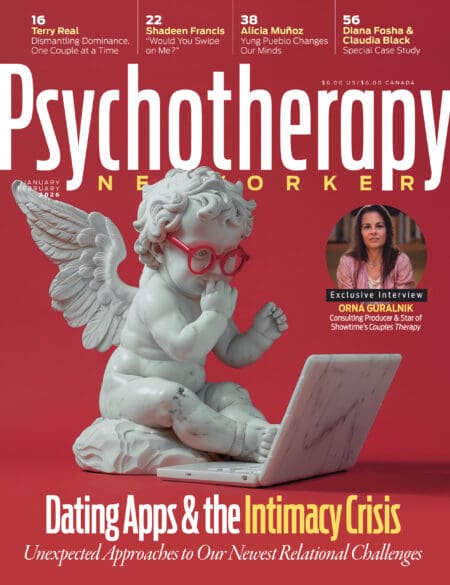Enjoy the audio preview version of this article—perfect for listening on the go.
Sex makes babies. So it is ironic that the child, the embodiment of the couple’s love, so often threatens the very romance that brought that child into being. Sex, which set the entire enterprise in motion, is often abandoned once children enter the picture. Why does parenthood so often deliver such a fatal blow?
The transition from two to three is one of the most profound challenges a couple will ever face. It takes time—time measured in years, not weeks—to find our bearings in this brave new world. Having a baby is a psychological revolution that changes our relation to almost everything and everyone. Priorities shift, roles are redefined, and the balance between freedom and responsibility undergoes a massive overhaul.
Eventually, most of us come to recognize ourselves again within this new context of family. For some of us, this is when romance starts to work its way back into the fabric of our lives. We remember that sex is fun; it makes us feel good, and it makes us feel closer.
But while some couples gravitate toward each other again, others slowly wander off on a path of mutual estrangement. Reclaiming erotic intimacy is not always easy. The case is often made that American parents today, regardless of class, are overworked and overwhelmed. We constantly sort conflicting demands into their appropriate hierarchical slots: The Crucial, The Important, The Dreamt of, The Ought-to. Sex often remains firmly at the bottom of the “to do” list, never fully relinquishing its last-place status to other, more mundane tasks.
Why is it that our erotic connection with our partner winds up so demoted? Does it really matter if the dishes aren’t done, or is there something more beneath our mysterious willingness to forego sex? Perhaps eroticism in the context of family is simply too difficult for anyone to embrace.
Parenthood, Inc.
Safety and stability take on a whole new meaning when children enter the picture. For children to feel confident enough to go out into the world and explore on their own, they need a secure base. Parenthood demands that we become steady, dependable, and responsible. We plant ourselves firmly on the ground so that our kids may learn to fly.
We do it for our kids, but we also do it for ourselves. Facing the great unknown of parenthood, we try to establish as much security as we can. We seek to contain the unpredictable by creating structure. In the process we cast aside what is frivolous, immature, irresponsible, reckless, for these clash with the task at hand: building family. “I got rid of my motorcycle when Jimmy was born. I’m not allowed to die in a bike crash anymore.” “It was all spur-of-the-moment for us before the kids. I’d call Dawn at the office at 5:15 to tell her about a band that was playing at 9:00, and she’d always meet me there. Now we buy season tickets but wind up giving half of them away.”
Family life flourishes in an atmosphere of comfort and consistency. Yet unpredictability, spontaneity, and risk are precisely where eroticism resides. Eros is a force that doesn’t like to be constrained. When it settles into repetition, habit, or rules, it touches its death.
Many of us become so immersed in our role as parents we become unable to break free, even when we might. “I knew we were in trouble when I couldn’t even think about having sex until all the toys were put away,” my patient Stephanie reluctantly admits. “And then there are the dishes, the laundry, the bills, the dog. The list never ends. If someone were to ask me, What would you rather do, mop the kitchen floor or make love to your husband?’ of course I would pick sex. But in real life? I push Warren away and grab that mop.” It’s easy to disparage the mop. Like a lot of mothers, Stephanie resents cleaning, even while she feels compelled to pursue the tidy household as an icon of successful motherhood. She finds herself irresistibly drawn to cleanliness, as if order on the outside can bring peace on the inside. And, to some extent, it does. These are activities with immediate and measurable results, far more manageable than the open-endedness and terrors of childrearing.
Children are a blessing, a delight, a wonder. They’re also a minor cataclysm. These cherished intruders fill us with a profound sense of vulnerability and lack of control. We dread the thought of something terrible happening to them or worse yet, of losing them. They hold us hostage to constant anxiety. We love them so much, and want to protect them at all costs.
Before Jake was born, Stephanie worked as an office manager in an international shipping firm. She had always planned on returning to work after her maternity leave, but Jake’s birth changed that. She couldn’t bear the thought of leaving him and, after doing the math, realized that most of her paycheck would go to the babysitter anyway. Five years have passed and Sophia has come along. “With a five year old and a two year old, I’m on mother duty 24/7. If I have any time left, I just want it for myself. When Warren approaches me it feels like one more person wanting something from me. I know that’s not his intention, but it’s how I feel. I don’t have anything left to give.”
“When did sexual intimacy become his need only? Do you miss the connection, too?” I ask her.
She shrugs. “Not really. I keep thinking that it will come back, but I can’t say I miss it.”
While Stephanie’s desire has remained stagnant, Warren’s frustration has risen exponentially. “I’ve tried everything,” he tells me. “She asks for help, I give her help. I do the dishes, I let her sleep late on the weekends, I take the kids out so she can have some time to herself. But, you know, I work, too. I’m meeting deadlines all day long. It’s not like I’m having a picnic. She thinks all I want is to get laid, but that’s not it. I want to come home and be with my wife sometimes. But all I get is a woman who’s become all mother.”
“Have you seen the movie Before Sunset ?” I ask him. “At one point the main character, Jesse, says that he feels like he’s running a daycare with someone he used to date.”
“Exactly!” he snaps.
Eros Redirected
Stephanie bursts with creativity: art projects, nature walks, trips to museums and fire stations, puppet shows, cookie-cutting, cookie-baking, cookie-parties. If we think of eroticism not as sex per se, but as a vibrant, creative energy, it’s easy to see that Stephanie’s erotic pulse is alive and well. But it no longer revolves around her husband. Instead, it’s been channeled to her children. Regular play-dates for Jake but only three dates a year for Stephanie and Warren: two birthdays, hers and his, and one anniversary.
Which brings me to another point. Stephanie gets tremendous physical pleasure from her children. Let me be perfectly clear here: she knows the difference between adult sexuality and the sensuousness of caring for small children. She, like most mothers, would never dream of seeking sexual gratification from her children. But, in a sense, a certain replacement has occurred. The sensuality that women experience with their children is, in some ways, much more in keeping with female sexuality in general. Female eroticism is diffuse, not localized in the genitals but distributed throughout the body, mind, and senses. It is tactile and auditory, linked to smell, skin, and contact; arousal is often more subjective than physical, and desire arises on a lattice of emotion.
In the physicality between mother and child lies a multitude of sensuous experiences. We caress their silky skin, we kiss, we cradle, we rock. We nibble their toes, they touch our faces, we lick their fingers, let them bite us when they’re teething. This blissful fusion bears a striking resemblance to the physical connection between lovers. In fact, when Stephanie describes the early rapture of her relationship with Warren—lingering gazes, weekends in bed, baby talk, toe-nibbling—the echoes are unmistakable. When she says, “At the end of the day, I have nothing left to give,” I believe her. But I also have come to believe that, at the end of the day, there may be nothing more she needs.
The Cult Status of Children
The sensuous pleasure of caring for small children is natural and universal. It is also wise from an evolutionary standpoint—the mother’s bond to her child is a powerful physiological response that has been selected for since humans were apes. The infant’s survival depends on it. However, I’d like to make a distinction between the parent-child bond, on the one hand, and a recent culture of childrearing that has inflated that bond to astonishing levels on the other.
Stephanie’s intense focus on her kids is not a mere idiosyncrasy of her mothering style. In fact, this kind of overzealous parenting is a fairly recent trend that has, one hopes, reached its apex of folly. Childhood is indeed a pivotal stage of life whose future repercussions are indelible. But the last few decades have ushered in an emphasis on children’s happiness that would make our grandparents shudder. It’s a far cry from the days when children were considered principally as economic assets to the collective, and women gave birth to many in the hope of keeping just a few. We no longer get work out of our children; today we get meaning.
Meanwhile, American individualism, with its emphasis on autonomy and personal responsibility, has left us between a rock and a hard place when it comes to family life. On one hand, we have children vested with sentimental idealization and a culture of childrearing that demands considerable emotional and material resources. On the other, we have a society notably lacking in the public support necessary to complete this fundamental project. We are left with isolated domestic units: overworked parents deprived of extended families, kinship networks, or real institutional assistance.
The magnitude of childrearing, coupled with the scarcity of resources, affects mothers in particular, who carry the majority of the burden in heterosexual couples. And it doesn’t end there. For this unprecedented child-centrality is unfolding against the backdrop of romanticism that underscores modern marriage. Not only do we want to be perfect parents, to give our children everything, we also want our marital relationships to be happy, fulfilled, sexually exciting, and emotionally intimate. Indeed, in our culture the survival of the family depends on the happiness of the couple. But cultivating the ideal relationship requires care and attention, and this competes directly with the “full-contact” parenting many of us embrace.
Warren Wants His Wife Back
Stephanie and Warren embody a common marital configuration: she is wrapped up with the kids, exhausted, and uninterested in sex; he is frustrated and lonely. Warren feels displaced, and claims he’s been fed a litany of excuses for years. By the time they come to see me, they’re locked in a pattern. He initiates, she rebuffs, he feels rejected and withdraws, she feels emotionally bereft and even more distrustful of his sexual motives. They blame each other for their sexual unhappiness, and each holds the other responsible for making it better.
I am worried about them, and I let them know it. I am worried not because I think that a couple without sex can’t have a viable relationship—the absence of sexual desire, when it’s mutual, is not necessarily an indicator of dissatisfaction. However, and this is a big “BUT,” if one partner really misses sex, and can’t engage the other, a pernicious downward spiral is set in motion.
What Stephanie fails to see is that behind Warren’s nagging insistence is a yearning to be intimate with his wife. For him, sex is a prelude to intimacy, a pathway to emotional vulnerability. She responds to him as if he’s one more needy child, and doesn’t realize that this is not just for him but for her, too. She’s so mentally organized in terms of what she does for everyone else that she is unable to recognize when something is offered to her.
What Warren finds intolerable is that his approach is having the opposite effect of what he intends. He is desperate for a flicker of desire from Stephanie, but he wants it just to be there, sudden and whole, the way it is for him. I explain to him that expecting our partner to be in the mood just because we are is a set-up for disappointment. We take their lack of desire as a personal rejection,and forget that one of the great elixirs of passion is anticipation. You can’t force desire, but you can create an atmosphere where desire might unfurl. You can listen, invite, tease, kiss. You can tempt, compliment, romance, and seduce. All of these help to compose an erotic substrata from which your partner can more easily be lifted.
Even before having children, Stephanie’s sexuality was always more receptive than initiating, and she rarely experienced spontaneous desire. In those days, Warren’s role was lavishly complementary: her coyness was dissipated by his assertiveness. He not only made her feel desired and desirable, he also made her feel desirous. He would entice her slowly, gradually awakening her senses, and she would eagerly respond. This responsiveness, so marked in the early days of their courtship, temporarily masked her long-standing lack of sexual agency (a characteristic shared by many women). I point out to him that she might be more receptive today if he paid attention to cultivating her desire rather than simply monitoring it.
“Stephanie needs you to take the lead, but you can’t just buy her a ticket, you have to get her interested in the trip.” I tell Warren.” You play an important role as the keeper of the flame. Right now, all she feels is pressure. She experiences your come-ons as abrupt and intrusive. She thinks all you want is sex. Prove to her you don’t.”
Looking for Stephanie
It was harder for me to reach Stephanie, for neither she nor I could easily separate ourselves from the abundance of ideological pressures that lurked beneath the surface of our conversation. Validating her husband’s needs could easily be construed as denying hers. How to invite a woman to reconnect with her body and her sexuality, separately from her children, when she’s completely uninterested in either, or when she feels undeserving or too maxed out? How to avoid the pitfall of swinging back and forth between her children’s needs and her husband’s needs, leaving her own perennially unattended?
What I said to her was this, “You’ll never hear me say that you should force yourself. Nothing is more deflating erotically than sex on demand. But I do believe that sex matters: for you, for your marriage, and for your kids. I am puzzled by your willingness to forego such an important part of yourself. How did it come to be that, on the extensive list of things your children need, parents who have sex isn’t one of them?”
Together we probe the elusiveness of her sexual agency. We explore her sexual history, how sexuality was expressed in her family growing up, and what her earliest experiences were like. She tells me how awkward her own mother was around the subject of sex, never speaking frankly but only making veiled references to morality and sin. She has never conceived of her mother as a sexual being, and it doesn’t escape me that history might be repeating itself.
We talk about how her sexual identity changed as the result of pregnancy, childbirth, nursing, and motherhood. Putting her personal experiences in a broader cultural context, we discuss how the politics of motherhood, the chastity myth, and the medicalization of pregnancy and childbirth all conspire to denude motherhood of its sexual elements. I recommend the gem of a book Sexy Mamas by Cathy Winks and Anne Semans, which discusses the topic of sexuality and motherhood in an accessible, down-to-earth, and sex-positive way. I suggest she leave it in plain view on her bedside table.
Together we explore how she might reclaim a right to pleasure, with its inherent threat of selfishness, in a way that doesn’t leave her feeling like a bad mother. One upshot of these discussions is that Stephanie does something radical (for her)—she goes on a weekend retreat with her sister, leaving Warren and the children to their own devices. Getting to that point took a lot of work, but I sense that before she can open herself to sex, she needs to expand the domain of personal pleasure altogether.
I’m not big on homework in therapy, especially when the list of domestic tasks is already endless. At the same time, action is a prerequisite for change. So I ask Warren and Stephanie, at the end of one session, to each do one thing differently in the next few weeks. They need not talk about it, for their effort will not be measured by its success but only by its intention. “I’d like you to stretch, to do something, anything, that takes you a step further than usual.” To Warren I say, “At one time you pursued Stephanie with great creativity, but no more. There’s an assumption—and you’re not alone—that we need only pursue what we don’t yet possess. The trick is that in order to keep our partner erotically engaged we have to become more seductive, not less.”
At this point, sex has been relegated to what Warren wants and what Warren misses. Stephanie has shifted from being receptive to being reactive. It is a passive stance in which her main power is that of refusal. To her I suggest, “Keep in mind that there’s something limiting about an absolute no. What really hurts him is categorical rejection. You might find more freedom in “maybe” or “let’s kiss” or even “talk me into it.” Warren, more than anyone else, can help you to reconnect with the woman inside the mother. Can you imagine recruiting him rather than pushing him away? Invite him to invite you, and see what happens.”
Stephanie, consumed by motherhood, was too quick to dismiss the inherent value of Warren’s persistence. With him, and through him, she potentially can begin to disentangle from the symbiotic bond with her children and transfer some of her energy back to herself and her relationship. When the father reaches out to the mother, and the mother acknowledges, redirecting her attention, it serves to rebalance the entire family. Boundaries get drawn and new zoning regulations get put in place delineating areas that are adult only. Time, resources, playfulness, and fun are redistributed, and libido is rescued from forced retirement.
My work with gay and lesbian couples has led me to recognize that this dynamic is replicated whenever one parent takes charge of the kids, gender notwithstanding. What I see over and over is that the person who takes on the role of primary caretaker almost always undergoes changes similar to Stephanie’s.
The role of the more autonomous parent is to help the primary caregiver disengage from the kids and reallocate energy to the couple. “Leave the toys for now, nobody is going to give you a medal, go take a nap.” “The nanny is here, let’s sit down for ten minutes and share a glass of wine before she leaves.” It’s a different approach to the traditional “division of labor,” one which emphasizes shared responsibility and mutuality and honors the interdependent agency of both partners.
Lifting the Erotic Embargo
When Warren asks, “Want to?” and Stephanie finally answers, “Convince me,” their dynamic begins to shift. It puts a halt to the grinding antagonism and introduces an overdue mutuality. The couple is headed in the right direction, but the forces of eros are not yet aligned. Warren’s most elaborate seduction rituals are thwarted, repeatedly and pitifully, by an unaccommodating home life.
If Warren and Stephanie are going to get their groove back, they need to free themselves from the disproportionate focus on their kids, both emotionally and practically. As much as spontaneity is desirable, the reality of family life demands planning. Couples without kids can initiate sex on a whim, but parents need to be more practical. Be it a regular date night, a weekend away every few months, or an extra half-hour in the car, what matters is that the couple cordons off erotic territory for themselves. When Warren and Stephanie balk at the idea of premeditated sex, I respond, “Planning can seem prosaic, but in fact it implies intentionality, and intentionality conveys value. When you plan for sex, what you’re really doing is affirming your erotic bond. It’s what you did when you were dating. Think of it as prolonged foreplay—from twenty minutes to two days.”
Not only do their rendezvous help maintain the emotional connection so critical for Stephanie, they also help her to make the transition from full-time mom to lover. “For so long, my thinking about sex was about how to avoid it. Knowing that Warren and I have a date has helped me to anticipate it instead. I pamper myself. I take a shower, shave my legs, put on make-up. I make a special effort to block the negativity and to give myself permission just to be sexual.”
My work with them isn’t finished. Things have definitely improved, but for this couple, and for this woman, caring for small kids doesn’t agree with eroticism. I suspect that when they reach the next life stage—when the kids are both in school full-time and Stephanie is back at work as she plans—new energies will be released. In the meantime, thinking of it as but one phase in a life-long relationship helps them remain patient and hopeful.
Sexy Mamas Do Exist
The liberation that so bolstered women’s sexuality has yet to cross the threshold of motherhood, which has not lost the moralistic aura of sanctification it always had. The desexualization of the mother is a mainstay of traditionally patriarchal cultures, which makes the sexual invisibility of modern, Western mothers seem particularly acute. Perhaps it’s our Puritan legacy that strips motherhood of its sexual components, convincing us that lustfulness conflicts with maternal duty.
Of course, there is not one America, and cultural differences abound within this vast country. My friend June is quick to remind me that not all Americans came here on the Mayflower. “Black people are certainly not spared our share of sex problems, but we’re definitely a lot less hung up than you white folks,” she says. “Sex is a natural part of life, not some big dirty secret. My kids know I have sex; I knew my parents had sex. They’d put on Marvin Gaye, shut the bedroom door, and tell us we better not knock.” My Argentinean girlfriend jokes about how her husband calls her “mamita” in bed—what better way to co-opt the taboo? My Spanish colleague Susanna tells me that, in Madrid, her greatest sexual asset is her beautiful three-year-old son. “In New York it’s my accent, my hair, my legs, but definitely not my son.” My American patient Stacey, a white woman who lives in Brooklyn with her daughter, knows her demographics. “The only men who flirt with me are the West Indian pediatrician, the Russian dentist, the Italian baker, and the Puerto Rican grocer. The white guys? Forget it. If I’m with my kid, they look right past me.”
Despite the pervasiveness of this mindset, there are plenty of women who mount daily insurrections against the denial of eros. For them, motherhood heralds a newfound sexual confidence, a womanliness, and even the restitution of a wounded body. One day, I had back-to-back sessions, first with Stephanie, then with Amber. The realities of their daily lives shared an uncanny resemblance, but their experiences couldn’t be farther apart. Amber told me, “I used to say no to sex as a matter of course, who knows why? Denial of any desire, even hunger, was modeled for me by my 105 lb. mother. Before I had kids, whenever my husband asked me if I wanted to eat, I also said no. I refused out of habit, before actually registering the question.
“Now I know far more profound reasons to say no to sex: the desperate fatigue of new motherhood, the seemingly bottomless rage at my 2 1/2-year-old for waking up his sleeping infant brother, the bitterness of feeling unsupported, a workhorse for our home and children. And yet I am the one who feels hungry for sex, who demands it, or mopes about not getting it. I give all day in very physical ways: nursing, cooking, stooping to pick up toys, carrying children, changing diapers. After a few days of peanut butter sandwiches and Wiggles CDs, when I am a participant in my children’s world to the exclusion of my own, I want my glass of sherry, my music, and my man.”
For Renee, pregnancy ushered in a self-acceptance she had never felt. “Pregnancy was a healing experience for me. I was sexually abused as a child, and had always loathed any signs of womanliness in my body. I’d been at war with my thighs for twenty-five years. I was hospitalized for an eating disorder the year before I got pregnant. In fact, I was so skinny I didn’t even think I could get pregnant. I hadn’t had a regular period in years. But the minute I saw that plus sign in the ept everything changed. It was the first time in my life that food became decontaminated. I relished watching my body grow ripe. For once in my life my breasts were naturally round and I was so proud. Most of my friends complained of the discomfort and weight gain. But for me, I felt like it was finally okay to look like a woman. I gave birth naturally; it was powerful. I was amazed by what my body could do and what it could endure. I was capable of so much more than I thought. Ever since, when I make love, I pursue that intensity.”
When Daddy Sings the Baby Blues
For every man like Warren, who feels sexually abandoned when his wife becomes a mother, there is a man like Leo, whose libido makes a break for it on the way home from the delivery room. Dwindling desire in mothers is, in some ways, old news. We might not like it, but we can at least make sense of it. But what are we to make of the father who can no longer eroticize the mother of his children? This story, though just as common, is admitted far less frequently.
When Carla and Leo came to see me, she was at wit’s end. They’d been together seventeen years: the first six a frenzy of the flesh, the next four the chaos of babyhood, the last seven a sexual desert. She went from talking to pleading to screaming to compensating. She had a number of flings and then a serious affair. He found out, she threatened divorce, he suggested therapy, and here they are.
She says, “I am so sick of the excuses. It’s his work, it’s the stress, it’s his dying father, his back hurts, it’s my breath, it’s my weight, it’s his weight. I took it personally for so long, but now I’m done. I love this man, I’m prepared to stay, but I can’t live like this.”
He says, “I always considered myself to be very competent sexually. We kid around that we broke furniture when we first started dating; there was a lot of passion. I never looked at the kids as a defining moment in my life sexually, but obviously something switched somewhere deep inside.”
I learn that Leo had begun to withdraw physically when Carla became pregnant with their first son, and they had no sexual contact at all during the last trimester. Leo just came home later and later from work. Carla knew something was up, though they never discussed it openly.
“What changed for you when she became a mother?” I ask.
“Her significance,” he answers. “Her whole being turned from being my lover, my partner and wife, to being the mother of my son. And then the mother of my other son. For a while they needed her completely, and that was really okay with me. I thought it was the most awesome thing in the world to have our babies sleeping next to us, for her to nurse them through the night. I wasn’t jealous at all. I’m a very loving, nurturing father myself.”
“What’s it like to suck the breast of a woman who’s been nursing a baby?” I ask him.
“It was weird,” he answered. “The whole physical thing was a little weird. I watched her give birth, twice, and I gotta say it was not so great for our sex life.”
“I know it’s supposed to be this magical moment, the miracle of life and all that, but no one seems to want to acknowledge the yuck factor,” I reassure him.
“I became different with her, more cautious, not as free. I guess it stopped me from being aggressive or passionate or desiring her in that way—really giving myself to her, or taking her, when normally that’s how we were together. It was definitely a shift.”
“Couldn’t do that to the mother of your children?” I ask.
“Apparently not,” he answers.
“Let’s talk about this whole Madonna/ whore business,” I continue. “It has deep psychological roots. A lot of men find it difficult to eroticize the mother of their children. It feels too regressive, too incestuous, too Oedipal. What you need to remember is that she’s their mom, not yours. At this point, I recommend anything that can introduce a little healthy objectification. Anything that might distinguish her from The Mother.”
Carla had been quiet for much of the session, but the following week I had no doubt she’d been paying attention. Laughing, she told me the story.
“I really wanted to let go with Leo. I wanted to give him an involved, prolonged, great blow job. Not just the compulsory head, not just the polite head. But I knew there was this thing with the wife, The Mother. Would he let me? So I initiated this game and said, [bullet]You know, we can have a couple different kinds of sex and you can call it what you will, but if you want this blow job to continue it’s gonna cost you.’ I said, “A hundred bucks if you want that kind of head. A hundred bucks.” I thought the money would be fun, but I was really into seeing if Leo could de-role that mother. Well, you don’t pay the mother of your kids for a blow job, do you? You don’t pay your wife for a blow job. It was a lovely experiment, that’s all I’m going to say.”
“Maybe you could start taking credit cards. Keep a credit card machine by the bed,” Leo jokes.
Carla’s playful erotic intervention has stayed with me for years. In one gesture she cleverly captured and subverted the whole dilemma: how to retrieve the lover from the mother. Leo feared expressing the rawness of his desire to the mother of his children, a woman too worthy of love and respect. Carla took a risk, interrupted the pattern, and invited him into an erotic complicity.
Escaping the Siege of Family Life
Having a child is a pure, life-affirming act. How cruel it is to see it erode the force that brought it into being.
There is no question that children make the erotic connection more difficult to sustain.
For many parents, the idea of a secret garden inspires everything from acute guilt and anxiety to the more benign gradations of embarrassment. We are afraid that our adult sexuality will somehow damage our kids, that it’s inappropriate or dangerous. But whom are we protecting? Children who see their primary caregivers at ease expressing their affection (discreetly, within appropriate boundaries) are more likely to embrace sexuality with the healthy combination of respect, responsibility, and curiosity it deserves. By censoring our sexuality, curbing our desires, or renouncing them altogether, we hand our inhibitions intact to the next generation.
There are so many reasons to give up on sex that those who don’t are champions in their own right. The brave and determined couple who maintains an erotic connection is, above all, the couple who values it. When they sense desire in crisis, they become industrious, and make intentional, diligent attempts to resuscitate. They know that it is not children who extinguish the flame of desire: it is adults who fail to keep the spark alive.
From Mating in Captivity by Esther Perel. Copyright © 2006 by Esther Perel. Reprinted by permission of HarperCollins Publishers.
Photo by William Fortunato/Pexels
Esther Perel
Psychotherapist and New York Times bestselling author Esther Perel is recognized as one of today’s most insightful and original voices on modern relationships. Fluent in nine languages, she helms a therapy practice in New York City and serves as an organizational consultant for Fortune 500 companies around the world. Her celebrated TED talks have garnered more than 40 million views and her international bestseller Mating in Captivity: Unlocking Erotic Intelligence became a global phenomenon translated into more than 30 languages. Her newest book is the New York Times bestseller The State of Affairs: Rethinking Infidelity (HarperCollins). She is a Licensed Marriage and Family Therapist, an AASECT certified sex therapist, a member of the American Family Therapy Academy and of the Society for Sex Therapy and Research. Esther is also the host of the hit podcast “Where Should We Begin?” which is available on Apple Podcasts. Her latest project is “Where Should We Begin – A Game of Stories with Esther Perel.” Learn more at EstherPerel.com.












